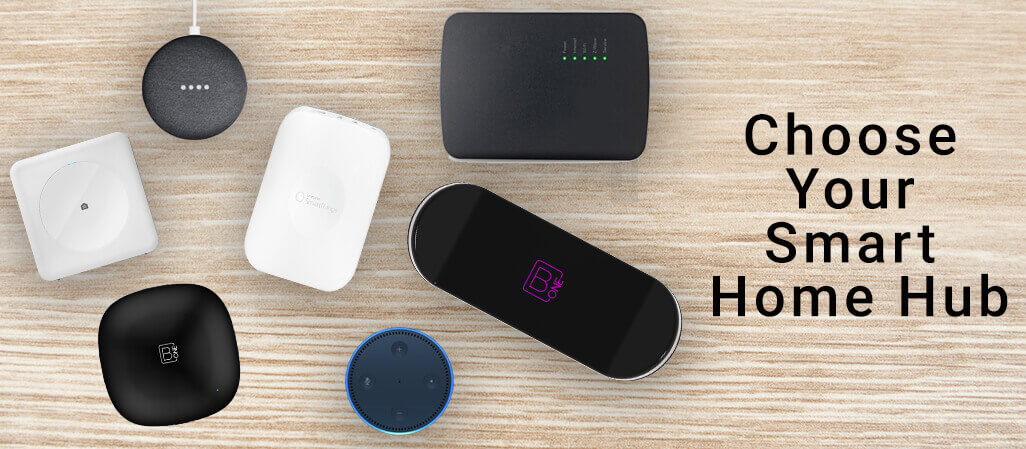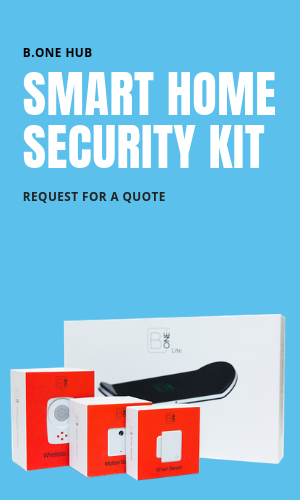What Are Smart Home Hubs And How To Choose One?
What are smart home hubs?
Anyone considering upgrading their home to a smart home invariably considers getting a smart hub for managing all of their devices. A smart hub forms the “heart” of a smart home. It brings all devices under one control thus being a master controller of an integrated system.
Smart home devices are integrated with different communication protocols like Bluetooth, Wi-Fi, Z-wave, Zigbee, WeMo, etc. Smart home hubs help these devices “talk” to each other and work in coordination. They allow you to sync your devices like smart thermostats, smart lights, window blinds or TV and create routines.
#Choosing the right smart home hub
A smart home hub acts as a universal remote control and is usually connected with a mobile app or voice-control feature or both to be able to be operated by the user. Some latest hubs do not use physical hardware at all and rely completely on the cloud to connect all smart devices together. However, an uninterrupted Internet connection is a must for such kind of smart home integration. A physical smart home hub is still a better solution until the cloud technology is made reliable and fool-proof.
While biggies like Amazon, Apple, Google, Samsung offer great smart home hubs that are compatible with their own smart devices and a few others, a number of third-party hubs are also out in the market that works equally well or maybe even better in integrating devices of a number of different makes.
So how do you go about choosing the right smart home hub for your smart home?
Before plunging into buying your smart home hub, it is best to make a list of the smart devices you own and confirm whether the hub you are zeroing down on works well with these devices.
There are many smart home hubs available that connect with a wide range of smart devices. You may want to pick up one that integrates with the devices you have in your home as well as to the ones you are planning to buy in the future.
Here is a list of factors you should consider when choosing your smart home hub.
1. What communication protocols does the smart hub offer?
Smart devices use a host of protocols to transmit data and communicate. From Bluetooth to WiFi to Zigbee and Z-Wave, you can find all kinds of data transmission technologies used by a smart device.
Choose a hub that is fitted with maximum number of communication protocols to be able to control most of your smart devices. Take your time to plan your investment well and seek out a hub that will deliver the best in your smart ecosystem.
2. Can the smart hub be voice-activated?
While most smart hubs are integrated with voice sensors to respond to voice commands, not all are. An added voice-control functionality elevates the entire experience of running a smart home. Imagine picking up your phone and “telling” your smart hub that you are going to be home in 10 minutes. The smart hub immediately kick starts your routine letting you come back to a well-lit, cozy home with tea ready in your smart kettle!
Buyers with apprehensions of having a hub that is “listening” all the time may want to opt for smart hubs with remote or app control only. But if you fancy a hub that can follow voice commands like Amazon Echo, Google Home or other voice-controlled hubs, ensure that this feature is available in the hub of your choice before buying. Voice-controlled smart hubs are particularly useful in assisted-living and are valued for the convenience they offer.
3. Is the smart hub compatible with your phone’s OS and does it offer extra-functionality?
Smart home hubs today including third-party hubs are compatible with both Android and iOS systems and their apps work effortlessly over smartphones with these Operating Systems. However, you may have a tough time if you use a Windows or Blackberry smartphone. Do check up on the compatibility of the hub’s app with your phone before making the purchase.
Having been around for a few years now, smart hubs with better abilities and higher performance are constantly being introduced. Adding a smart hub to your home means another added device and hence, more device clutter. Smart hub manufacturers are, therefore, innovating to add more functionalities to the smart hub to reduce device clutter.
For example, many new smart home hubs can act as a WiFi router or a security hub. In the future, the smart home hub will be as prevalent as internet routers and become a central information system for your entire home control system.
Hence, look for smart hubs that provide more value with respect to their functionality at home.
4. Does the smart hub offer device-to-device automation?
Choose smart hubs that are built around a powerful software platform that can help you create device-to-device automation like IFTTT (If This Then That). Device-to-device automation has become an integral part of setting up a smart home. It helps create routines and allows room to customize schedules where action on one device triggers specific action on another. Apart from the fanciness it offers, device-to-device automation comes in most useful when home security is in question.
For example, when you are away from home, motion sensors can trigger security alarms upon sensing an intrusion, in turn triggering all doors to be locked, blinds to be closed, alerts to be sent to you as well as the nearest police station to be notified.
Not every smart home hub is enabled to create such automation. So, make sure that the hub you are planning to buy offers device-to-device automation capability.
5. Ease of use is important too.
Try the smartphone apps of different smart hubs before buying yours. Download the app from the app store and see if it is easy to set up a rule and integrate two or more devices. Also, what different functionalities are offered by the smart hub can be understood by trying out its app.
Your smart hub is practically the only smart device you want to control. The functioning of your smart home is going to depend on it. So make sure that the app is easy to use.
Additionally, some smart hubs come with a built-in rechargeable battery while some need to be connected to a power outlet. While a wired hub means you will have to find a place at home with a power outlet for it, it still usually works better as you don’t need to worry about power-drain.
Also, wired hubs come loaded with more features. However, you can still go for a battery-powered one if you want to place your hub at a location where there isn’t any power outlet close by.
Final Words
All said and done, as a rule of thumb, a smart hub should be capable of delivering practical and intuitive automation and partner easily with your smart ecosystem. It should also help running your home more cost-effectively while enhancing your daily life.
Pick a smart hub that fits your budget, needs, and lifestyle. Smart hubs let you experience a complete smart home with great interconnectivity and control over your devices.
About B.One Hub Australia
B.One Hub Australia is a leading home automation company in Australia. B.One lets you set actions to “control your home from anywhere in the world”. Get in touch with our active customer support for more information or call @ 1800 180 810.
Read as Infographics





LEAVE A REPLY